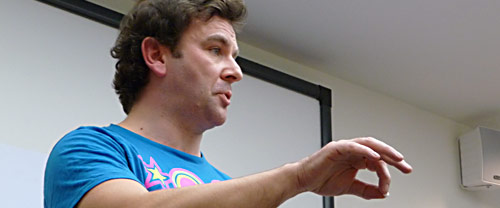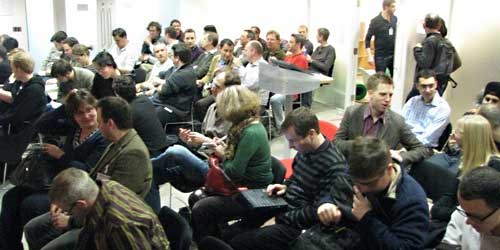If you were to ask me what has been the single most influential thing to have happened in UK digital government in recent years, my answer would be the annual BarCamp / UKGovCamp. That first event, in late January 2008, helped form a community of civil servants and external suppliers; and demonstrated a desire, on both sides, to use modern technology’s new opportunities to do Government better.
So much so, in fact, that people willingly gave up a Saturday to come along. In the civil service, that’s pretty much unheard of.
To me, that was its defining characteristic. We all had something ‘better’ to do: social life, family duties, supermarket trips, even just sleeping off the exertions of the week before. In my own case, it’s the weekend of my wedding anniversary. But we all felt this was more important.
Last year, I picked up rumours suggesting that some people had claimed a ‘day off in lieu’ to attend. In some respects, that’s a compliment to the continuing success of the event, and its perceived importance in the government webbie calendar. But it felt at odds with the idealism of the day. I didn’t like it.
And so to this year (or rather, next year)’s event. Tickets for UK GovCamp 2012 went on ‘sale’ on Monday – and promptly ‘sold out’ (of the initial allocation) in just a few short hours. Clearly it’s seen as being more essential than ever – which is good. But something has changed. Something significant.
GovCamp is back, BACK, BAAAAAACK for 2012 and it’s bigger and badderer than ever.
Not just one day of fab conversations, networking, sharing tales of woe and mass tinkering – but two!
- FRIDAY 20th January sees the usual GovCamp experience of crowdsourced unconference sessions where delegates talk about the stuff that interests them
- SATURDAY 21st January is the all new GovCamp Doing Things day, where everyone attending can dream come some cool stuff to do, whether it’s collaborating on the best social media strategy EVER, running some training sessions on creating video, or build some useful app or other with some data
Will Friday be the usual GovCamp experience? No, I don’t think it can be. It completely changes the ‘ask’.
The vast majority of the civil servants will, presumably, have had to ask their boss’s permission to attend. That means they’re effectively attending in an official capacity. In theory at least, they will have to be careful what they say. Gone is the freedom, both formal and perceived, of attending in your own time.
Myself, as an external attendee coming from a distance, I’ll have to make alternative domestic arrangements, to get the kids to school. I’ll have to pay for a weekday, on-peak train ticket. And of course, I’ll be sacrificing a normal working day, costing me a notional few hundred quid. A day when most clients, current or potential, will be at their desks. My phone will have to remain switched on.
In Steph and Dave‘s defence, there is still a Saturday element – although at first glance, it looks like a completely different event, and aimed at completely different people. It isn’t the only *Camp being organised on a weekday: a week from now, I’ll be en route to Paris for a vendredi WordCamp. And of course, I ran my own Word Up Whitehall event on a Monday – although I’d argue, the rules of engagement there are slightly different.
If it’s a sign of the GovCamp ‘movement’ growing up, then I suppose it’s a positive. But it’ll be sad if, in doing so, we’ve lost the thing which put its motives beyond any doubt.




